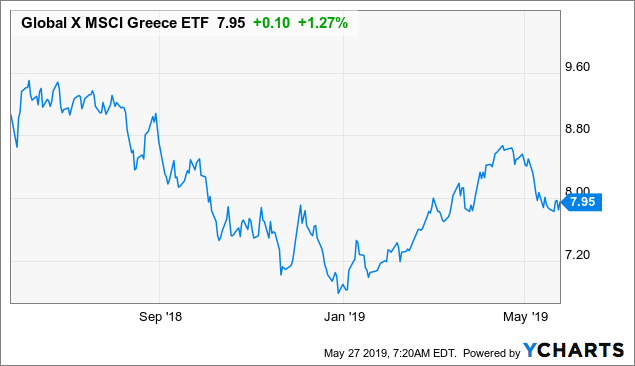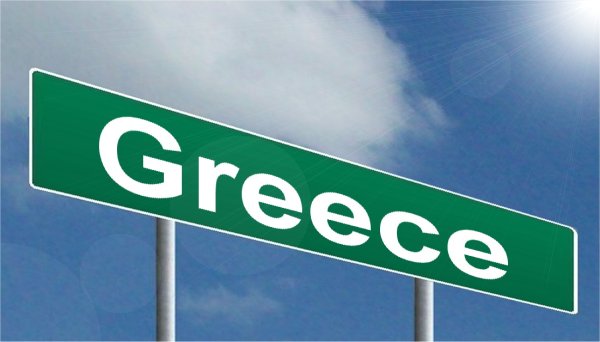[ad_1]
For a tired nation, election season promises change. It should also provide a spark to Greek stocks as new ideas are born and as hope is refreshed for an equity market absolutely desolated by a decade’s worth of decline. However, the elections being held now in Greece are simply a catalyst for Greek stocks already favored by fundamental support. The election results will simply serve to signal that fact to the broader investing public now. Look for capital to start its return to Greece as a result. U.S. and other investors who want to effectively invest in Greek equities and diversify risk to specific stocks at the same time have very few options. However, the Global X MSCI Greece ETF (GREK) is an easy way to invest in a broad basket of Greek stocks and participate in the recovery of Greece, and so I expect the security to benefit from increasing investor interest. I am thus initiating coverage of the Global X MSCI Greece ETF at Strong Buy for long-term investors.
 Data by YCharts
Data by YChartsThe Greece ETF
The Global X MSCI Greece ETF (GREK) is already up nearly 14% year-to-date through May 24, 2019. The Greece focused security invests a minimum of 80% of its assets in the MSCI All Greece Select 25/50 Index, which includes the largest and most liquid stocks in Greece. It’s an investment in Greece, which has been anything but investable for quite some time.
At the same time, the prospectus shows that the GREK offers partakers interests in the most liquid stocks in Greece, which unlike the U.S. market, does not offer a huge selection of blue chip securities. The funds’ factsheet shows its top holdings recently included well-known Greek stocks like Hellenic Telecommunications (OTCPK:HLTOY)(OTCPK:HLTOF) (14.16% of assets); Alpha Bank (OTCPK:ALBKY) (OTCPK:ALBKF) (7.88%) and several other large banks listed below; OPAP SA (OTCPK:GOFPY) (OTCPK:GRKZF) (6.96%); Jumbo SA (OTCPK:JUMSY) (5.02%), GasLog Partners LP (GLOP) (4.12%), GasLog Ltd (GLOG) (3.88%), Motor Oil Hellas Corinth Refineries SA ADR (OTCPK:MOHCY) (3.88%); and Hellenic Petroleum SA (ELPE.AT) (3.29%). As limited as the Greek market is, the GREK security still offers access to quick diversification across industry sectors, including financials, energy, consumer and telecommunications.
The Greek stock ETF is up this year, after shedding 29.9% in returns before taxes in 2018, versus the 30.21% decline of the underlying benchmark. Over the course of the last 12 months, the ETF is down roughly 16%, so the year-to-date gain simply represent the partial recovery of the prior year’s loss. The ETF has benefited this year along with the broader equity markets from the oversold state of stocks at the start of the year. But there is something more behind this year’s momentum for Greek stocks that I believe is about to be catalyzed.
Greece’s Economy is Gaining
The Greek stock market has underlying fundamental factor support. The Greek economy is relatively strong today compared to times past, though it is still lacking on an absolute basis. But let’s not miss the good news, because change matters for investment securities.
Greece’s Gross Domestic Product ((NYSEMKT:GDP)) increased by 1.9% in 2018, the fastest pace since before the economic crisis. This has built upon the 1.5% growth seen in 2017. Moreover, the outlook for 2019 and 2020 is for 2.0% growth or better according to the Organization for Economic Cooperation and Development (OECD) and the International Monetary Fund (IMF).
While it took much austerity, reform and pain to get here, along with the help of global growth, the rewards are starting to be realized for Greece more specifically. This is good news for Greek investment assets, but it does not end there.
Defrosting Capital from the Greek Debt Crisis
Capital is finally being freed up, both at the sovereign level and in the private sector. The Greek government is slowly coming out from under the thumb of international creditors and regaining access to capital markets. As the Greek government is freed of its burden, it appears ready to reduce the load on Greek citizens as well.
Greece is seeking early repayment of roughly 3.7 billion euro worth of its nearly 10 billion euro loan from the International Monetary Fund (IMF). The move makes sense, as it will remove a high-cost funding source carrying a roughly 5.1% interest cost, thus lowering the overall cost of debt to the nation. As its debt costs are reduced, Greece will free up capital for other uses, some of which may include stimulus. Stimulus feels taboo for Greece at this point, the country plagued by forced austerity for the last decade.
Of course, Greece could use freed capital to further reduce its debt, given that it will continue to have a significant sovereign burden post the IMF payoff. It is again finally raising capital from the financial markets after a nine-year hiatus; Greece raised 2.5 billion euro via a 10-year bond offering in March. Greece’s 10-year bond yield is about 3.3% now, which is a marked improvement from its emergency funding source at the IMF.
Greece’s government has suffered a hard cost in getting Greece back to financial respectability, but not as hard a cost as its citizenry. I am so sorry for the Greek people, as I have witnessed firsthand their suffering through heavy taxation and reductions of desperately needed entitlement programs. So I can understand why the Greek government must find ways to start giving something back even while it still works toward a more efficient system.
Still, a recent giveback sure felt politically motivated, given its timing. Just days before this past weekend’s elections, a package of tax breaks and bonuses for pensioners were introduced and passed by Greece’s Syriza-led government. Included in the package are cuts in sales taxes on necessities like foodstuffs, electricity and gas.
Other benefits of Greece’s gains should be seen shortly in the business and personal finance sectors. That is because Greece’s banks are also coming out from under the dark cloud of bad debt that has kept them from spurring a faster economic recovery.
As Greece’s Banks Recover, so Shall Everything Else
Simultaneously, as Greece’s sovereign debt problem is being cured, so are its private sector issues being solved. Greece’s largest banks, namely, National Bank of Greece (OTCPK:NBGIF)(OTCPK:NBGGY), Piraeus Bank S.A. (OTCPK:BPIRF)(OTCPK:BPIRY), Eurobank Ergasias S.A. (OTCPK:EGFEF)(OTCPK:EGFEY) and Alpha Bank (OTCPK:ALBKY)(OTCPK:ALBKF), are freeing up capital as well. Over the course of the last year or so, all four of Greece’s major banks have completely repaid their crisis era funding from the Emergency Liquidity Assistance (ELA) program of the Bank of Greece. At the same time, private sector deposits have been growing; by some 8% to be specific from June 2015 to February 2019. Like the Greek nation, the Greek banks have thus reduced their cost of capital and improved profitability, not to mention their lending capacity.
While some 87 billion euro of emergency funding from Greece’s central bank has been repaid, Greek banks still hold roughly the same amount in nonperforming loan exposure. Roughly 45% of Greece’s four systemic banks’ total loan books consists of nonperforming loans, even despite reducing bad debt exposure by 21% over the last four years. That level of bad debt still compares extremely poorly to the rest of Europe.
But there is good news to report on this front as well. Greece’s banks agreed in March with the European Central Bank’s (ECB) Single Supervisory Mechanism (SSM) to reduce their non-performing loans by 60 billion euro by the end of 2021. This will bring their bad debt down to sub-20% of their total portfolios, though that still compares poorly to the rest of Europe. The banking system in Spain carries roughly 6% bad loans to its total today. Still, we are on the right track finally, and in a direction that should prevent the Greek banking system from being a bottleneck to economic expansion.
Several plans are in development, which will require special approval from the European Union. Though, in my estimation that appears to be plausible. Once the banks can free themselves of their nonperforming loan burdens, they will finally be functioning normally for the first time in years. Like the situation with the broader nation, as the funding capacity of Greece’s banks is freed, they will be enabled to better serve private sector growth. Thus, Greece is finally financially prepared, or nearly so, to drive more robust economic expansion and higher equity values. I expect that Greek banks will lead gains for the Greek stock market, given their cyclical nature. So, it’s a bonus that the Global X MSCI Greece ETF is heavily loaded with financial sector stocks, comprising some 22% of the total portfolio. Likewise, I believe the 17% portfolio exposure to consumer discretionary stocks works for this economic resurrection story. You can refer to the recent factsheet for further industry sector weights.
The Greek Election Catalyst to Capital Flows
Over the weekend, Greece held important elections. The result shows the Greek people want change. The ruling party, Syriza, suffered significant defeats in the first round of the European Elections and local municipal elections nationwide. As a result, the Greek Prime Minister, Alexis Tsipras, announced he will call for early national elections after the second round of local elections is finished this coming weekend. This result, signaling change, is a catalyst for the Greek stock market still trading at historic lows.
While U.S. markets rested for the Memorial Day holiday, stocks in Greece were working hard. The general index of the Athens Exchange (ATHEX) opened up by 5% on heavy volume Monday. The yield on the 10-year government bond narrowed by nearly 30 basis points, to 3.08%, as bond investors likewise expressed their enthusiasm for change in Greece. But this is just the beginning.
Buy Greek Stocks & Greece Now
The election catalyst should not serve Greek stocks for just a day. I expect that this will drive attention to a neglected sovereign opportunity. The result should be capital flows into Greece and its equity and fixed income markets. Underlying economic cause has been in place for some time, and the trend is for further improvement back toward normalcy for Greece. Therefore, I look for the Global X MSCI Greece ETF to easily recover this year to its prior 52-week high mark of $9.51. That would mark a 20% gain for the index from Friday’s close, and will serve as my 6-month price target for the time being. As for valuation, Greek stocks are still trading at a low level that has not been seen in decades. An investment in the GREK ETF here is an investment in a turnaround in Greece that has today both the underlying factor dynamics necessary for marked change over the next few years and the catalyst to start capital flowing back into relative investments now. Buy the Global X MSCI Greece ETF for efficient access to a broad basket of Greek stocks.
Disclosure: I/we have no positions in any stocks mentioned, but may initiate a long position in GREK over the next 72 hours. I wrote this article myself, and it expresses my own opinions. I am not receiving compensation for it (other than from Seeking Alpha). I have no business relationship with any company whose stock is mentioned in this article.
[ad_2]
Source link Google News

